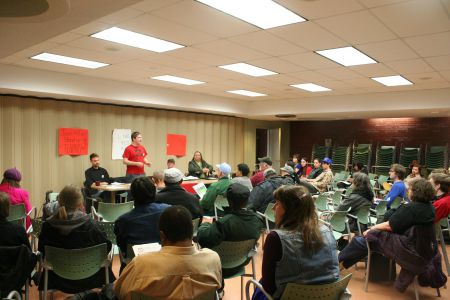What happened on Monday is proof of how divorced from reality we are. Progressives, radicals, the Left, whatever you call the people who believe in and strive for deep social change - we are disconnected from the majority of people. We are insulated in our communities of like-minded activists, surrounded by people with similar beliefs and thoughts.
For most of us, the loss of Megan Leslie and Peter Stoffer was unfathomable. There was no way that voters would turn against some of the best politicians in the country, especially not Megan, a celebrated local hero.
The most casual of observers recognize that Canadians did not vote for Trudeau; they voted against Harper. Even more so, they did not vote for Andy Filmore, or Darrell Samson or many of the other Liberal newcomers. They voted against Harper, Megan Leslie and Peter Stoffer were casualties in the cross fire.
Still, beloved as they are, their defeats were crushing. Megan lost by over 7,600 votes and Stoffer by over 6,500.
Those margins are shocking. The fact that we could not anticipate, let alone imagine the choice of so many voters is deeply concerning.
I think this is our greatest failing; we are caught up in echo chambers, surrounded by people who think and believe similar things. Everyone we know supported Megan; they changed their profile pictures, they posted about her, and many made phone calls and canvassed. Halifax seemed to be a sea of orange. Everywhere around us our opinions were reinforced.
Our Facebook and Twitter feeds are an endless reflection and reiteration of our world views. We often fall into the trap of extrapolating trends from this limited and very biased sample and applying them to the rest of the country.
It needs to be said again and again: social media is no substitute for the long slow work of organizing.
We live in a bubble, and a small one at that.
What amounts for debate in our feeds and in our communities is at best a discussion of tactics, and at worst a display of activist fashion trends.
We have grown comfortable with our own, coddled with cushy reinforcement of our beliefs from all sides. These soft supports serve us best as a padded cell. They do nothing for social change.
We cannot overlook the NDP’s own failings. The last several decades have seen them lurching toward the centre, hoping to outdo the Liberals and Tories in their own neo-liberal clothing. The party has traded the Socialism of its youth in order to become a “mature party,” less threatening and more palatable to the corporate media and business classes. They aimed for respectability, when what Canadians wanted was inspiration.
In an election where voter turnout increased by 10%, the NDP lost over 1 million votes from 2011. Hopefully this serves as a wakeup call for them. The NDP are not a vehicle for structural change though, and we forget that at our own peril.
The amount of radicals in this country is small enough to be discounted. We cannot even influence the most left leaning of political parties to adopt a progressive vision.
The Left is fragmented and weak. We are disconnected from the majority of working people. Yet, we remain content to squabble with each other over dogma and revolutionary purity.
We must now do the hard, unglamorous work of talking to and living with people different from us. We have been content in our own company for too long, and we see the result of it. We have become divorced from reality.
We need to be in constant conversation with people who believe differently than us (or don’t believe at all). It will be uncomfortable and, at times, tedious. We need to get better at explaining our ideas to families, to older generations, to rural people, to the apolitical. We need to live with difference, to organize among it, and to build the bases for our movements upon it.
No amount of flashy actions will save us. No disruptions, banner drops, or media stunts can give us a short cut. It will not be cool, or always fun. There is no replacement for face-to-face organizing and community building. What we need is not propaganda of the deed, but the power of word – that is the deep, messy and ever-evolving personal relationships of community. We need the power of connections over the comfort of identity.
“When more than three-fourths of our people from the point of view…of their self-identification are middle class, it is obvious that their action or inaction will determine the direction of change…
Our rebels have contemptuously rejected the values and the way of life of the middle class. They have stigmatized it as materialistic, decadent, bourgeois, degenerate, imperialistic, war-mongering, brutalized and corrupt. They are right; but we must begin from where we are if we are to build power for change, and the power and the people are in the middle class majority.”– Saul Alinsky
Follow James Hutt on Twitter @JamesRHutt



